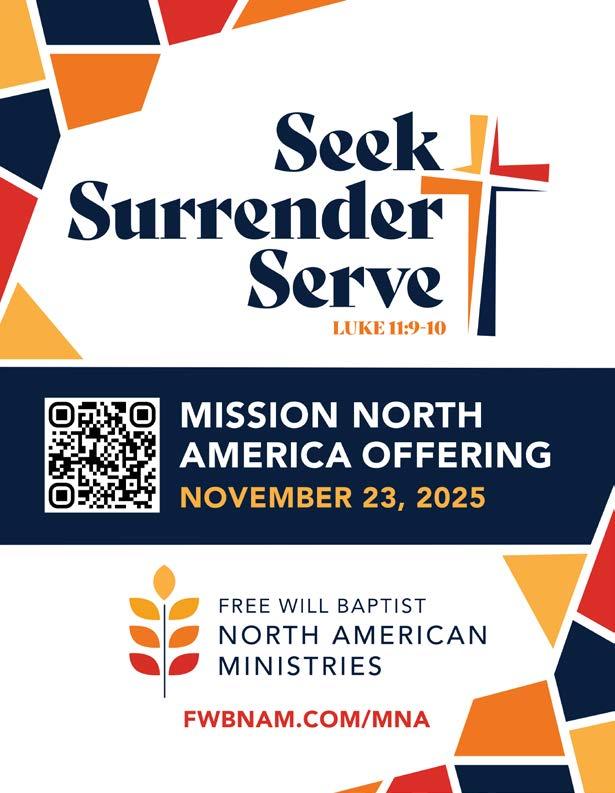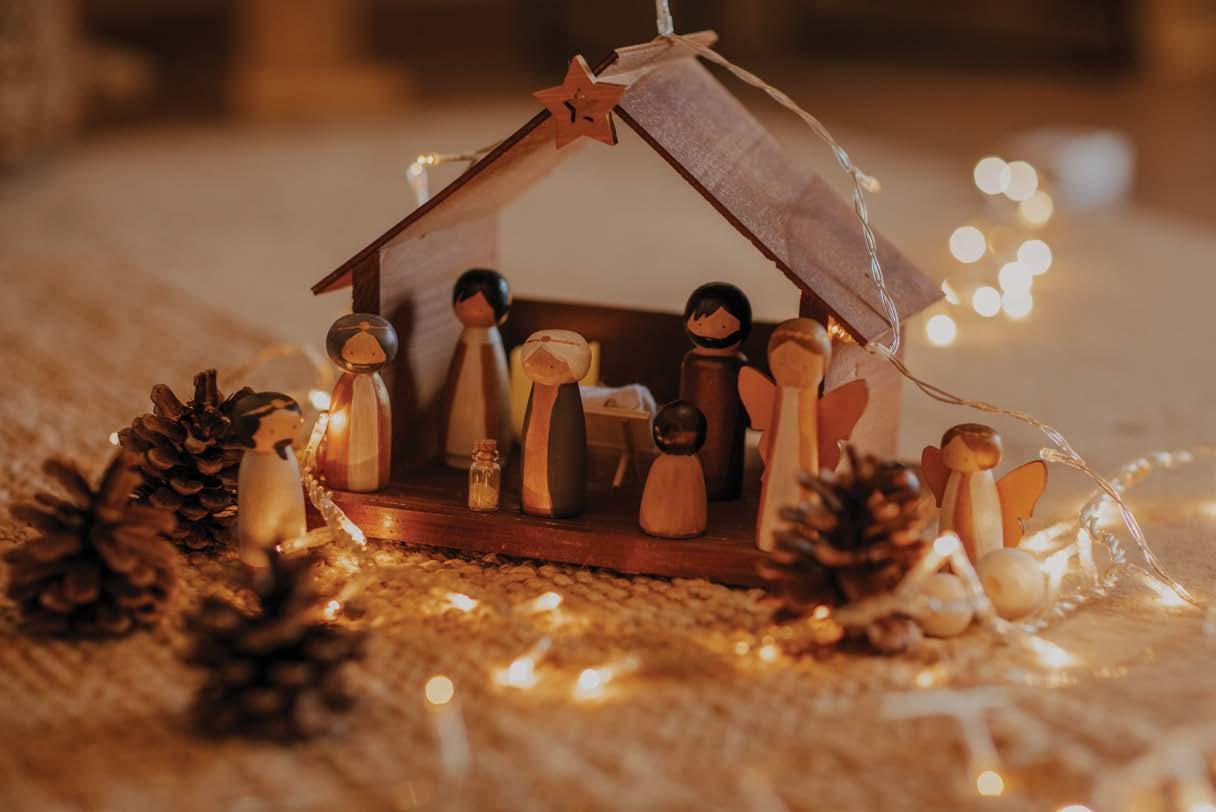TREASURE
Helping Women Fulfill the Great Commission
FEASTING ON GOD’S WORD | MARRIAGE SUPPER OF THE LAMB | THE CENTERPIECE OF CHRISTMAS



Helping Women Fulfill the Great Commission


Volume VI, Issue 4 | October-December 2025 | WNAC.ORG

Feasting on God’s Word ........... 5
Do you find God’s Word sweet to your taste? Is finding time to enjoy the sweetness of His Word difficult for you?
Marriage Supper of the Lamb .. 14
What is your attitude about waiting for Christ’s return? Is it even on your radar for upcoming events? In what ways might our daily activities crowd our perspective on His return?
The Centerpiece of Christmas.. 22
Who do we praise? Where should we praise? When do we praise? Why should we praise? How are we to praise? Are we encouraging others to praise?


ISSN 8960038
Volume VI, Number 4
Editorial Staff
Ruth McDonald, Director
Phyllis York, Editor-in-Chief
Tori Matlock, Design
WNAC Board
Rachell Burchett, Kentucky
Sharon Dickey, Texas
Tracy Payne, Arkansas
LeeAnn Wilfong, Missouri
Jessica Edwards, Tennessee
Katie Postlewaite, South Carolina
Melanie Franks, Alabama
Angie Fraser, Florida
Ashley Alphin, Ohio
Contributors
Virginia Justice, Tennessee
Ashley Brummitt, Tennessee
Carol Reid, Tennessee
LeeAnn Wilfong, Missouri
April Tummins, Tennessee
TREASURE (ISSN 8960038) is produced quarterly by Women Nationally Active for Christ of the National Association of Free Will Baptists, Inc., 5233 Mount View Road, Antioch, TN 37013-2306. Copyright privileges reserved. A 2025 Member of Evangelical Press Association. Mail questions or comments to: Treasure, PO Box 5002, Antioch, TN 37011-5002 treasure@wnac.org | wnac.org | @WNACFWB
Judy Lytle, Tennessee
Cindy Cunningham, Tennessee
Tracy Payne, Oklahoma
Sarah Sargent, Ohio
Ruth McDonald, Tennessee

Tracy Payne serves with her husband, Russell, in Springdale, Arkansas. She is mother of five and “Chick” to one grandson. She loves Women’s Ministry, especially Bible Study, and can often be found in a local thrift store.
BY: Tracy Payne
In the winter of my senior year of college, I became engaged. Early that spring, my father suffered a massive heart attack, followed by heart failure while in the hospital. We spoke often during his weekslong recovery several states away. One day, he said, “My doctor says I can come to your graduation.”
That lit a fire under us. We were not completely aware of what his prognosis would be going forward, so my fiancé and I decided to get married. I mean, in a hurry. My graduation was on Friday, May 13th, and we went straight to the printers and had our invitations printed for Saturday, May 14th. Things were a whirlwind for those few weeks, but we checked everything off our list.
As we read about the marriage ceremonies in God’s Word, we see much preparation. They had to make plans for guests, places for guests to stay (sometimes for a whole week), as well as food! Unlike the three-week preparation for my wedding, these families began preparing for this marriage supper when their children were born. It was a time of covenant and honor between the bride and groom. We see this in the Old Testament with Isaac, Leah, and Rebekah. We also see this in the New Testament at the wedding of Cana, where Jesus was an integral part of the success of that marriage supper. To be included in the marriage supper was an honor for the guest.
The preparation for the Marriage Supper of the Lamb began the moment the Lamb— the Lion of the tribe of Judah—stepped forward, took the scroll, and broke its seals, as described in Revelation 5. This celebration is being prepared for all who have come to faith in Christ. From the moment you were born again, you joined that list. Our Savior—our Kinsman Redeemer, our Groom—is overseeing it all.
While exciting, my “wedding feast” consisted of pizza the night before accompanied by the sounds of tornado sirens. However, Revelation 19:7-9 depicts a much more joyous occasion where we will ever be glad, rejoice, and honor the Lamb.

BY: Virginia Justice
“When I was but a girl in days of childhood, I used to play till evening shadows come; then traveling down that old familiar pathway, I’d hear my mother call at set of sun, ‘Come home, come home, it’s supper time, the evening shadows fall; Come home, come home, it’s supper time…” (Suppertime by Ira Stanphill).
As a child, every supper was a feast! Why? Because it came from Mama. Granted, I was not as excited when a bowl of ‘mashed potatoes’ turned out to be a bowl of mashed turnips, but there was always a food I enjoyed!
So, it is with feasting on God’s Word. The feast is set before you, but it’s up to you to sit up at the table and begin to eat. There is no force feeding, no “You’ll sit right there until your plate is clean!” Only you can choose to feast at the table spread before you. There is joy in the feast, there is pleasure, there is fulfillment, there is contentment, there is peace! Even when parts of the feast are not to your liking, you will always find provision for your needs.
Just as our physical body has appetites and needs, so does our soul. Physically, we need nourishment. Spiritually, we need nourishment. When longing for peace, happiness, and contentment, we are satisfied through feasting on His Word.
As a child, our family of four sat down to supper every night. Once the blessing was given, my dad always looked at my mom, and with a twinkle in his eye, asked the same question, “What’s for dessert? I want to be sure I leave plenty of room.”
My dear mother was a great cook and a wonderful baker. Everyone loved her cooking! A friend recently said to me, “I just made your mom’s Jam Cake! I have several of her recipes and I use them all the time.” At our Poole Family Reunion last year, a cousin brought a Pumpkin Cake with a note that announced, Aunt Wilkie’s Recipe. Mama’s cooking left a lasting impression.
Even more important is the lasting impression God’s Word can make in our lives. Sweetness can be found in Scripture, sweetness that is a balm to your soul, an encouragement to your spirit, and uplifting to your daily walk with Jesus. But that impression, that sweetness can only be enjoyed if we partake of what is offered.
His Word tells us:
“How sweet are your words to my taste, sweeter than honey to my mouth!” (Psalm 119:103).
“For He satisfies the longing soul, and the hungry soul he fills with good things” (Psalm 107:9).
“Oh, taste and see that the LORD is good! Blessed is the man who takes refuge in him!” (Psalm 34:8).
When I sat down to supper, just a taste was never enough. I always wanted more, eating until my hunger was satisfied. So, it should be with God’s Word!
Do you find God’s Word sweet to your taste? Why? Why not?
Is finding time to enjoy the sweetness of His Word difficult for you?
One of the most important things you can teach yourself is the habit of daily feasting on God’s Word. The question is: how?
Today’s world offers us so many opportunities to read/listen/learn daily. We have Christian radio and television, the Bible and Bible resource apps on our phones, and multiple personal devices that make the Bible easily accessible. Saturate your day with Scripture and music that uplifts God and uplifts you. Listening to Christian radio and podcasts will draw you closer to the One you long to know better.
“Blessed are those who hunger and thirst for righteousness, for they shall be satisfied” (Matthew 5:6).
“The LORD bless you and keep you; the LORD make his face to shine upon you and be gracious to you; the LORD lift up his countenance upon you and give you peace” (Numbers 6:24-26).
God’s word encourages us to seek Him daily. “Give us this day our daily bread” (Matthew 6:11).
Something to Consider:
What do you hunger for in your life? Is it God’s presence, His peace, or something else?
Jesus is your Savior and Lord…do you want Him to be your best friend?
Do you want Him to walk with you daily?
For that to happen, you must have the closeness to God you crave and need.
You must spend time with Him. I can hear it now, “Time?” If you had any idea of my schedule, my responsibilities, etc. True, I do not know yours, but I know mine, and it’s crazy!
Have you ever wondered how some can get so much done in a day, and you struggle to get the dishes out of the sink?
Do you spend too much of your time complaining that you do not have time to get it all done? Stop!
Take a deep breath and think about it. We all have the same 24 hours in a day.
Did you get that? Each of us has a 24-hour day given to us. How we use it is a choice we make. It may take some extra planning and some extra effort on our part, but we can carve out time to spend with the Lord every day.
First, set aside a time for personal, daily moments in God’s Word. It might not be easy the devil will distract you in every way possible. Set a specific time and also choose a backup time. Depending on your daily schedule, your Bible study may vary every day. But determine to carve out a time each day to spend in God’s Word. Corrie Ten Boom said, “If the Devil cannot make us bad, he will make us busy.” Resolve not to fall into his trap.
Make up your mind and do it. Once it becomes a daily habit, you will wonder how you ever managed without it; it will be a resting place for you, a haven, a place of encouragement and peace.
Remember:
“When your day is hard, in the presence of the Lord.

One of the most important things you can teach yourself is the habit of daily feasting on God’s Word.
He knows what you’re going through, He sees your struggle. Your broken heart is safe with God. He counts your tears and hears your silent prayers. Your Father has not forgotten or forsaken you.” (Author unknown)
Scripture provides us the joy and peace we seek in our lives. In its sweetness, we find strength for each new day. As Christians, we are to live for God every day. Scripture challenges us to be all that we can be for Jesus.
The devil is alive and well! We see that in our world with more and more frequency. Ideologies, beliefs, lifestyles that are so far from God and His teachings for His creation abound all around us.
“Be sober-minded; be watchful. Your adversary the devil prowls around like a roaring lion, seeking someone to devour” (1 Peter 5:8).
“I have stored up your word in my heart, that I might not sin against you” (Psalm 119:11).
“Your word is a lamp to my feet and a light to my path” (Psalm 119:105).
One of the greatest challenges we face is obedience. Yes, obedience.
Obedience does not come easily. Yet, obedience is foundational in our walk with God. From the Ten Commandments: “Honor your father and mother, that your days may be long upon the land…” (Exodus 20:12). “Children, obey your parents in everything, for this pleases the Lord” (Colossians 3:20).
Look for a moment at the word obedience. Notice the small word in the center: Obe—die—nce. That small word has significance when you consider the definition of obedience. Simply and somewhat profoundly, obedience means you die to self. To be truly obedient, you must die to what you want, what you think is
best, what you believe is the answer, and what you desire. As naturally selfish human beings, that is a tough pill to swallow!
Have you ever known a child who enjoyed being told no? It is doubtful. After children, grandchildren, and forty years in education, I have yet to meet one. You would be hard pressed to even find an adult who appreciates hearing no. Yet, it is part of life. The word is a great teaching/learning tool! Although not easy to hear or accept, it is necessary.
God’s ways are best.
“For I know the plans I have for you, declares the LORD, plans for welfare and not for evil, to give you a future and a hope” (Jeremiah 29:11).
God does not tell us to understand. We are to trust.
“Trust in the LORD with all your heart, and do not lean on your own understanding. In all your ways acknowledge Him, and He will make straight your paths” (Proverbs 3:5-6).
God’s timing is always right. Yours is not.
“For my thoughts are not your thoughts, neither are your ways my ways, declares the LORD. For as the heavens are higher than the earth, so are my ways higher than your ways, and my thoughts than your thoughts” (Isaiah 55:8-9).
God will never leave you. People will.
“…for he has said, ‘I will never leave you nor forsake you’” (Hebrews 13:5).
The challenge of obedience is one we must accept. Obedience is a daily struggle! We must obey God first and foremost. Study of His Word directs us in the obedience He expects from us. His laws and commands are evident when we read and study His word. The more we read, the more we study, the more we learn regarding His law, His commands. True happiness and peace come from obedience to God.
Accepting the challenge of obedience leads to other challenges. Accepting those challenges will lead to changes in our lives. Obedience to God will bring
You can give no greater gift than encouragement.

changes in the way we live, the places we go, the things we say, the things we do, and the way others see us.
Something to Consider:
Is change difficult for you? Why or why not? Is change necessary for you to move forward? Remember change is not bad, it’s just different. Do you struggle with obedience?
THE FEAST: Encouraging Others in the Word
Encouragement! You can give no greater gift than encouragement. Encouragement comes in many forms—a smile, a hug, a word, a card, a shared experience, and most of all, sharing Scripture.
Dr. David Jeremiah wrote, “Even Jesus needed the help of an angel in the most difficult moment of His life. He was in the Garden of Gethsemane, praying
to the Father about the path ahead of Him—a path leading to the cross of Calvary. And ‘an angel appeared to Him from heaven, strengthening Him.’ So great was His anguish that He sweated drops of blood as He prayed (Luke 22:43-44). If Jesus needed strength and support in a trying moment of His life, how much more might we or others in our lives need the same?”
Jesus provides the help and encouragement we need through His Word and the Holy Spirit. He also gives us opportunities to share with others—in our family, at church, at work, during a trip to the store, over lunch with a friend, or simply throughout our day. Sometimes, these opportunities are placed right in our path; other times, we must intentionally seek them out.
“A word fitly spoken is like apples of gold in settings of silver” (Proverbs 25:11). Solomon reminds us a word carefully chosen and spoken at the right time is
of great value—like a drink of cool water to a parched and hurting soul.
You may be thinking, there’s nothing I could ever say that would meet those qualifications. Oh, really? How do you know? You don’t! God, through the ministry of the Holy Spirit, can use your words to make a difference. You may never be aware of the difference you have made in someone’s life.
My daddy was my hero, my best friend, my counselor, my go-to guy! God called him home to Heaven at the young age of 66. Heartbroken does not begin to describe my state of being during that time. A large crowd attended his visitation, each one speaking words of kind remembrance of him, expressing sorrow to Mama, my sister, Bonnie, and me. Words much appreciated. One person stands out to me. As I stood at the casket, deep in my sorrow, a friend approached, placed her arms around me, held me close, and cried with me. She never spoke one single word. Yet, she shared my grief in a way that I hold dear today, 38 years later.
So, you see, you do have the ability to help, encourage, and uplift everyone you encounter. Sometimes through a kind word, a sent card, a prepared meal—or most importantly, a shared Scripture. Each of these simple acts can make a lasting difference.
Often, you may never know the impact you’ve made. But now and then, God may graciously allow you a glimpse.
Through forty years in Christian Education, the Lord allowed me the privilege of working with many, many children. During my years of teaching third grade (the best grade to teach), He allowed me the opportunity to share in many young lives. Oh, I loved my little ladies and gentlemen!
One year I taught a group of children who were especially frightened of storms.
At the hint of a rain drop and a slight rumble of thunder, their anxieties began to rise. And, wouldn’t you know it, that year we were in a classroom located at the outside corner of the building with more windows
than other classrooms, and also that year we seemed to experience more stormy days than ever before!
After pausing and praying for God’s protection over us, we attempted to continue our lessons. Praying helped, but I still saw anxious faces and hearts before me. It troubled me greatly! I wanted to help them! And God gave me an idea.
We memorized Psalm 56:3: What time I am afraid, I will trust in thee.” My husband helped me print and laminate business-sized cards with that verse. Each student received a card with instructions to keep it with them, or place it on their mirror at home, or in some prominent place as a reminder of God’s presence and promise.
Years later, a former student stopped to speak to me. (It was always a thrill for me when one of my children took the time to chat.) This young man said, “Mrs. Justice, I want to show you something.” He opened his wallet, pulling out the small, laminated card I had given him in third grade! He said, “See, I’ve never forgotten.” With tears in my eyes, I thanked him, told him how very proud I was of him, that I loved him, and encouraged him to always remember that promise. This young man was in the 8th grade. I was overwhelmed with joy and gratitude to God for the gift God gave to me that day!
Do you know of someone who could use a word of encouragement?
Have you seen or heard of anyone who could use some help?
Are you willing to share with others the feast God has provided?
Listen! Do you hear His call—come home to His Word—enjoy the feast!!
About the Writer: Virginia Poole Justice is a wife, mother, and “Mama Jen” to four grandchildren. She served 30 years as a pastor’s wife and 40 years as an elementary teacher and principal. A member of New Hope FWB Church in Joelton, TN, Virginia enjoys time with family and friends.

BY: ASHLEY BRUMMITT

Did you know that one in every three bites of food is directly the result of the work of pollinators? This is one of my favorite facts about honeybees. With a rich heritage of full-time farmers and backyard garden enthusiasts alike, I truly appreciate what it takes to bring food to our table. Here in the south, we have just finished the summer harvest season. My family has enjoyed all the fresh vegetables from local farmers. Every cucumber my children can’t get enough of is the direct result of the honeybees’ work. Bees and farmers definitely have our respect!
My father was instrumental in beginning our family’s journey into beekeeping. He has been an apiarist, meaning a beekeeper, for over 20 years. I don’t remember how he even began, but I know it quickly grew from a single hive to well over 20 hives. He managed hives on his property, as well as for friends and neighbors. Each year he spent hours inspecting the hives: confirming the health of the hive, checking for intruders such as hive beetles or varimites, and making sure the bees had ample space to grow. These steps are essential to maintaining a successful hive. When my husband and I bought our own home in the city, we knew we wanted to begin our beekeep -
ing journey. Thankfully, we live in a neighborhood full of garden enthusiasts who love to keep our bees happy. It has been a sweet connection point with our neighbors. One neighbor constantly shares with me what he is adding to his landscaping, just so our bees have more nectar to harvest. We thank them in return by supplying them with honey. It has been a great avenue to speak to others about the beauty of God’s creation.
Our task as beekeepers is to ensure we provide a safe environment for our bees to do their best work. This means providing a well-built hive box and frames (referred to as woodware) in a safe, level spot away from animal thieves such as skunks and raccoons and giving the bees resources to defend the inside of the hive from pests. We are simply a support system for a well-organized community designed by our incredible Creator God.
With up to 80,000 bees in a healthy hive during the peak summer months, each bee must perform its assigned job. While only one queen in each hive lays all of the eggs, the worker bees (all female) take on the roles of gatherers, nursemaids, protectors, builders, etc. The drone bees (males) in the hive serve primar-

ily to mate with the queen to provide a growing brood for the hive. Since most bees only live a few weeks, especially during the demanding summer months, a thriving hive constantly needs to be refreshed with young bees. During their short lifespan, a worker bee can pollinate 5,000 flowers! All this work provides the hive with about one-twelfth of a teaspoon of honey. Their short lives directly impact the world around them with minimal reward for themselves. All of God’s creation has a purpose and special gifting. If we value the small honeybee, shouldn’t we see the value and purpose of everyone in our lives? Shouldn’t we, as believers, live our lives with purpose to use our gifting for God’s glory?
The first year that we managed a hive was disappointing. We thought we were prepared. We bought the books, the gear, the woodware—we did it all! My husband and I had made plans to harvest the honey from the hives, meaning to extract the extra honey the bees had produced, leaving enough for the bees to continue to live and raise their brood. From the outside appearance, the hive seemed healthy and thriving, and we were eager to taste the sweet honey they produced. Unfortunately, the day before we planned to harvest, we noticed there was zero activity outside our hive.
What is normally a constant coming and going freeway had fallen completely silent. We quickly donned our protective gear (jackets, hoods, and gloves) and inspected the hive. We found that not only were our bees gone, but so was all the golden honey they had produced. We were heartbroken. The bees had swarmed their home, taking all their honey with them to set up a new life elsewhere. Although swarming is common, we felt we had failed the bees in some way. We had allowed an unseen pest to take over the hive and force the bees out. We had no idea what detrimental pest was wreaking havoc underneath. Isn’t this true of so many in our communities, maybe even of ourselves? We keep up a great appearance, but we are struggling on the inside.
As more seasoned beekeepers now, we have seen years of loss and years of great production. We are certainly
not experts! We continue to reach out to mentors like my father and the local beekeeper association to help us navigate each new experience. Each year we hold our breath and hope that our hard work has paid off. Although pollinating the plants in our community is the main goal, the annual task of filling jars with the raw honey gathered from our backyard hives is one of the sweetest rewards.
Our friends and neighbors are always eager to get a jar each year. Some simply enjoy it as a natural sweetener, while others use it as a natural remedy for allergies, scrapes, and burns. No matter the motivation, seeing a jar of the golden honey feels like a true miracle. It is no coincidence that honey is mentioned in the Bible so many times: the golden nature, beauty, and unmatched sweetness. It never spoils and is a remedy for so many ailments. Much like honey, Scripture soothes our souls and brings healing to our broken lives.
May we be reminded when we see the honeybee:
1. We all have a job to do, a purpose that God created specifically for us as His children.
2. While our best efforts may seem to produce an insignificant result, we each have a meaningful impact on those around us and the world as a whole—a lasting impact we may never fully see.
3. Even when everything seems good on the outside, we may never know the heavy burdens hiding behind the surface. The people God has placed in our lives need our support and, more importantly, the caring hand of our Heavenly Father.
4. May we always cherish the Word of God! May we turn to Scripture for the healing words that offer pure joy for our lives.
About the Writer: Ashley Brummitt is a Nashville, Tennessee resident. Married with two young boys, her days are full! She loves all things home and DIY. When she is not helping the Brummitt backyard honeybees and chickens, she helps families and businesses in Middle Tennessee find their perfect corner of the world.

BY: Carol Reid
Just imagine as a newly engaged woman, you went to a bridal fair. You entered all the free drawings—free honeymoon, free photographer, free manicure, free wedding bouquet, free thank-you notes, anything they were giving away. Then at the end of the day, the wealthiest restaurateur in your town drew your name for a free wedding reception and dinner at the finest venue with a five-star chef and a full orchestra. We’re not talking about just cake and punch. This is sit-down, white tablecloths, fine china, six courses, real flowers, filet mignon and lobster. And our extravagant dinner pales in comparison to the wedding supper God is planning.
In 2024, the average cost of a wedding in the United States was $33,000. In my state, Tennessee, the average cost was only $28,600. Still, according to my calculations, that amount is more than three months’ gross income for the average household—a lot of money, planning, and sacrifice.
But a young woman’s wedding day is the highlight of her life. She wants to look her very best; she wants all her dreams to come true. She and her parents want to gather friends and loved ones to celebrate the new family.
Every detail is important—from the hard-to-book venues to the dresses, flowers, reception, photographer, invitations, and favors. Brides and grooms enjoy the spotlight. Dads and moms review budgets. Moms and daughters butt heads (and future mothers-in-law are required to keep their mouths shut). But all are focused on celebrating the union of the bride and groom.
Throughout Scripture, God has celebrated weddings—the official union of man and wife. He designed and blessed marriage. Jesus attended weddings and used them as the basis for His parables.
Scripture uses the metaphor of marriage to picture God’s intimate relationship and sacrificial love for the Church.
What are some of the “wedding stories” from Scripture you know about? (Check out Adam and Eve, Isaac and Rebekah, Jacob and Rachel, Hosea and Gomer, Boaz and Ruth, and others.)
When are weddings mentioned in the New Testament?
The marriage ceremony of Bible times looked different from ours in the twenty-first century. Marriage was celebrated in three phases. More than an engagement, the first phase of a marriage was a contract. The bride’s father met the groom’s family and arranged the marriage. The dowry was paid; the commitment was made. Legally, the couple was married, though they had not physically consummated their union. Only a legal divorce could break this marriage covenant. The bride continued to live with her family, the couple was chaperoned when they were together, and the groom began the work of preparing his home for his bride. This is the phase of betrothal, familiar to us in the account of Mary and Joseph (Luke 2).
In the next stage of marriage, the bridegroom came for his bride. He “came down the aisle” (or street) for her, to return with her to their home. Generally not a surprise to her, the exact timing was uncertain. She gathered her bridesmaids to wait for his arrival. This phase is featured in Jesus’ parable of the ten virgins (Matthew 25:1–13). Usually, proof the bride was a virgin was presented to the groom’s family, and in their new home, the marriage was consummated.
In the third phase, the party started. And it was quite a party. The guests were invited, the food was prepared, and the banquet began, often continuing for a full week. When Jesus turned the water into wine (John 2:1-2), He was attending this part of the marriage. The parable of the wedding banquet in
Matthew 22:1-13 was this part of the marriage He referenced.
For Discussion:
If you have been married, what was your favorite part of your engagement and wedding?
Mothers of the bride sometimes adopt the adage, “It’s not about the wedding; it’s about the marriage.” Why is the wedding an important part of marriage? What is the purpose of the wedding?
In those three phases of marriage, we can trace Christ’s relationship with His Church. The betrothal covenant involved a pledge and a payment. Jesus Christ vowed His love for His bride, the Church (believers), and laid down His life to pay the price to buy her for Himself (Ephesians 5:25-32).
One day, the Bridegroom will return for the Church, as the groom came for his bride in the second phase of the ancient marriages. Christ will rapture believers to the heavenly home He has prepared for them (John 14:3).
And God is planning the party (third phase)—the marriage supper of the Lamb (Revelation 19:6–10). All who put their trust in Him are included. All expenses are paid. All you need has already been provided. What a banquet it will be! Remember that wedding reception we imagined earlier? It can’t even begin to compare with what God is planning. “Eye has not seen, nor ear heard, nor have entered into the heart of man the things which God has prepared for those who love Him (1 Corinthians 2:9 NKJV).
For Discussion:
As the Church, the bride of Christ, we are still in the waiting-for-the-Bridegroom phase. How do you feel about waiting? What is your attitude about waiting for Christ’s return? Is it even on your radar for upcoming events? In what ways might our daily activities crowd our perspective on His return? What are some valuable practices we should be doing as we wait?
All of Scripture is our invitation to celebrate the New Covenant—the completion of all God has promised. God’s love story is spelled out on every page. He invites us again and again—to fellowship with and enjoy Him intimately. He wants to adopt us as part of His family. He has sent His servants to the byways and hedges to include everyone in the invitation— there is room for all who will accept Him.
For Discussion:
What are the invitations in the following verses?
Isaiah 55:1–3
Matthew 11:28
John 7:37
John 21:12
Revelation 3:20
Revelation 22:17
Yes, in our culture, the focus is generally on the bride. But that’s not true about Heaven’s wedding. The spotless, reigning Hero of the occasion, the Bridegroom headlines His special event. The hosts of Heaven rise in praise for the Lamb that was slain before the creation of the world. He is altogether lovely as He comes for His Bride (Song of Solomon 5:16). He has paid the ultimate price to purchase His bride (1 Peter 1:18-19), and He has prepared a place for her (John 14:2-3).
For Discussion:
How does Revelation 19:11-16 describe the Bridegroom?
The bride is the Church. In this instance, we are talking about the universal Church—all believers from all over the globe from all time. Yes, your local
church family of believers should be included in that glorious throng, but this word picture is bigger than that. The capital-C Church is the collective gathering of believers, joining the Bridegroom for the never-ending celebration in Heaven when the Devil is defeated and the victory is won. God has prepared for us, and we must prepare for Him. Note that the Church makes herself ready for the Bridegroom by dressing in robes of righteousness. In Revelation 19:7, the fine linen of her garment is described as the righteous deeds of the saints. Imagine, with each good deed you do as an act of gratitude to the God who saved us, weaving a beautiful wedding dress. Here, add this bit of lace with your kindness to your neighbor. Here’s a pearl button, fashioned when you gave generously to the needy. These are the good works prepared for us (Ephesians 2:10; Philippians 2:12) by our loving Father.
For Discussion:
What quality does 2 Corinthians 11:2 emphasize about the bride of Christ?
How does Ephesians 5:25-27 relate to Revelation 19:7-8?
Cue the “Hallelujah Chorus”! Multitudes are gathered to celebrate this wedding supper in Heaven (Revelation 19:1-6). As the bride and the guests of this spectacular culmination of history, we join in with the armies of angels and the hosts of Heaven to worship Jesus Christ. Like an ocean, like the sound of thunder, we unite our voices with the chorus singing praise forevermore. Each person is there because they have put their faith in God, and because someone has shared the good news of Jesus Christ with them. Do not grow weary in inviting others to be part of that joyful celebration.
For Discussion:
Who will be at the Marriage Supper of the Lamb?
Check out part of the list in Revelation 5:9. Why not get a little practice now? Stand up and read (together, if you’re in a group) Revelation 19:1–6.
Good news! Not only are you invited to this wondrous, fanciest-of-all-fancy weddings, but your clothes have already been selected for you. Unless you wear the garment provided, you can consider yourself uninvited. These Designer gowns are priceless, bought with the precious blood of Christ. They are without spot, blemish, or wrinkle. Our own righteousness is as filthy rags (Isaiah 64:6), but He has provided the wedding garment of salvation (Isaiah 61:10). Revelation 7:9 describes the symbolic white robes the multitudes will wear, accessorized with palm branches to wave in praise. We’ll all be “dressed in His righteousness alone, faultless to stand before the throne.”
For Discussion:
What did Jesus teach about the wedding garment in the parable in Matthew 22:11-13?
How can we be dressing for Heaven even now? (See Colossians 3:12-14.)
“Come and dine!” The table is set, but no candles are lit because the Light brighter than the sun illuminates the banquet. The crystal river flows, deep and pure. The twelve fruits grown on the tree of life are beautiful and delicious, and the leaves of the tree are for the healing of the nations (Revelation 22:1-2). The Bread of Life is warm and aromatic, and no one will hunger. No one will be needy. All are satisfied with the Bread of Heaven, feasting in the presence of the Bridegroom.
We are tired and live in such uncertain times. We feel convinced that His coming must be soon, and many of our loved ones have already gathered in Heaven. The wait seems inordinately long, but even the Bridegroom doesn’t know when the wedding will begin. No one knows. We are watching, ready and waiting, with our lamps trimmed and bright, extra oil stashed in our pockets.
Until He comes, let’s purpose to be aware that it may be any day, to daily choose those activities that will prepare us for His return. We need clean hearts and busy hands, as we are about our Father’s business now, readying for His kingdom to come. Maybe, like me, you are praying, “Keep me burning, burning, burning, till the Lord shall come.”
Waiting for the Lord to come again, Watching with our lamps all trimmed, Working for the kingdom until then, We’re waiting, watching, working for Him.
For Discussion:
Read Jesus’ parable about the ten virgins in Matthew 22:1-14. From examining your daily activities and choices, which group would someone place you in? What can you do to be certain you are prepared for the Wedding Supper?
My limited wealth will not make it past the pearly gates with me. I have nothing to bring of my own. My efforts are unacceptable. My talents are meager. So what can I give to my King? Revelation 4 speaks of casting our crowns at His feet, but I’m not sure I’ll even have a crown. Certainly, all I can give Him is what He has already given me. I want to willingly start now, laying up treasures in Heaven that will not rust out or wear out or be eaten away by moths or inflation.
Jesus Christ vowed His love for His bride, the Church (believers), and He laid down His life to pay the price to buy her for Himself.
For Discussion:
Reflect on David’s prayer of praise in 1 Chronicles 29:11-19. How did David describe God? What did he note about what we can offer to God? What did David ask of God?
Far beyond what I can fathom right now, I will give Him praise—endless praise. He is worthy of all our praise, and with a pure heart and unflagging strength, we will spend eternity giving it to Him.
The only other gift I can bring will be the ones I’ve brought to Jesus. Only my children. Only those children in Vacation Bible School. Only those friends and neighbors I’ve shared the gospel with. Only those missionary efforts that my offerings have funded, my prayers have supported. I want the wedding supper to be crowded with those dear people, won by God’s grace.
This is the best wedding you’ve ever been to. Even if you always cry at weddings, don’t bring your handkerchief to this one. God will wipe away all tears. You know those weddings where the photos take so long, and you feel like the reception is never going to be over? In this one, the party is going to last for eternity. And in Heaven, we’ll all live happily ever after.
About the Writer: Carol Reid works part-time at D6 Family Ministry and regularly serves in the Kids’ Ministry and the Sew Much More lifegroup at The Donelson Fellowship. She lives in Old Hickory, Tennessee.



The 2025 Free Will Baptist National Convention was another wonderful opportunity to see old friends, make new friends, and laugh with both. The Missouri Women’s Ministry board made cackles go around the room with their annual “fun time” during Laughter and Latte. If you have never been, Laughter and Latte is an annual fellowship which takes place directly after the conclusion of service on Monday. While there, you can treat yourself to ice cream, coffee, and other treats. This year’s theme: Dressed to the Nines had women attending with sashes, hats, and other fanciful attire as they celebrated WNACs 90th birthday!
The Celebration Service discussed the exciting things happening at FWB Women’s Ministries including Shine (our ministtry to teen girls), As You Go (the podcast which can be used personally, at church, or in a small group), the significance of 90 years of successful ministry, and the impact women have made in misssions both in the US and around the world. Ruth McDonald reminded attendees what it is to be a part of biblical ministry and the need to disciple other women and to uplift them.
For more information and news, please visit: wnac.org.






BY: LEE ANN WILFONG
“The doctors said there’s nothing else they can do. They told me it’s time for hospice.” This is a common phone call at the office where I work. Hospice is designed for patients with a life expectancy of less than six months. Of course, that’s not certain; some last longer, others only days or weeks. But the words “six months” are devastating.
For the unbeliever—one who has not accepted Christ—there is no hope. Some believe death is simply the end. Others know eternity exists but face it without salvation, aware of Hell, a place of agony and separation from God. Unless they turn to Christ, their years on earth are all they have. Without Jesus there is no promise of life, joy, or perfection—only eternal pain apart from God.
For believers, death is temporary. They know it is the beginning of eternity with God, in a perfect Heaven where there is no more dying, no more “six months.” Their hope carries them through with grace and peace.
Jesus illustrated this in Luke 16 with the story of the rich man and Lazarus. Neither of them realized they were living their “six months”. The rich man lived for the present with no thought of God. At death, he found himself in torment, longing for a drop of water. Lazarus, poor and suffering on earth, had trusted God. Now he was comforted in God’s presence while the rich man, too late, realized eternity was real.
At our hospice, nurses often describe patients’ final hours. Those who know Christ often die in peace, while others thrash, moan, and require heavy medication.
I recall two men who died about the same time. One had refused every offer of prayer, even though his wife pleaded with him to consider his eternal destiny. His final hours were restless and painful. The other, a preacher, testified of God’s love until his last breath. Surrounded by family singing hymns, he slipped into a coma. As they sang, “He walks with me and He talks with me,” the nurse could no longer hear a heartbeat. He had stepped into the Garden with his Savior. His “six months” were over, and eternity with Christ had begun.
“I pray that… you may know the hope to which he has called you, the riches of his glorious inheritance in his holy people” (Ephesians 1:18).
About the Writer: Lee Ann Wilfong has been actively involved in women’s ministries since her teens, and currently serves on the Women Nationally Active for Christ board. She and her husband, Vernon, live in Park Hills, Missouri, and attend Leadington Free Will Baptist Church.

About the Writer:
Sarah Sargent loves to laugh and make others laugh even more. She is a third-generation member and leader in Free Will Baptist Women’s Ministries. She currently serves as president of the women’s ministry at Reynoldsburg Free Will Baptist Church and president of Ohio Free Will Baptist Women’s Ministries.
BY SARAH SARGENT
Have you ever gotten the church giggles during a Christmas play at church? No matter how hard kids practice something always seems to go awry—and that’s when the giggles set in.
One year, when I was a kid, our church put on a play called Christmas from Scratch. It was about a group of kids living alone, led by a young adult named ‘Scratch’ because he could make anything from scratch. That year, no one volunteered to play Scratch, so the directors recruited my dad.
Let me share some backstory: my dad was stretched thin, working full-time at an insurance company and part-time evenings at Arby’s. On top of that, Scratch was supposed to be handy at building things—an area where Dad’s skills were, well, limited. Giving dad one of the main roles of this play was a recipe for giggles.
To help him, they color-coded all the pieces he was supposed to assemble on stage. As the performance grew closer, Dad realized he hadn’t fully memorized his lines. His solution? Giant cue cards, made with poster board and a Sharpie, which my mom faithfully held up behind the curtain.
During the performance, the big moment arrived: Scratch had to build a manger from scrap wood while singing a song. Dad wrestled with the pieces, barely finishing as the son ended. Just as he finishes the manager, barely finishing as the song ends, disaster struck. Mom dropped all the cue cards. The audience couldn’t see what happened, but they certainly noticed the look of sheer panic on Scratch’s face.

For the next 30 minutes, Dad ad-libbed nearly everything. There was a lot of giggling on and off stage, as the kids stumbled through their parts.
At our church, Christmas plays were often recycled every few years. Christ-
That one was definitely a “one and done.”

BY: April Tummins
During the short weeks between Thanksgiving and Christmas, obligation rather than joy can easily be the centerpiece of our hearts due to the high demands of our time, energy, and focus. When I was a little girl, my grandmother taught me a simple song about how to spell joy—Jesus, Others, and You. In the spirit of living out this season with true joy, we will look at Psalm 150:1-6, specifically unpacking the purpose and importance of praise during the Christmas season.
Consider the characters making up the first Christmas story: a virgin girl, a courageous husband, a band of lowly shepherds, a caravan of regal wisemen, and heavenly angels. From outcasts, to elitists, to the divine, all took part in reverencing the presence of God’s gift to mankind—Jesus. From various backgrounds and for specific roles, they were called together for the express purpose of giving glory and honor to Jesus. Like them, we too are called to the joyous worship of Christ the King.
Psalm 150:6 says that “everything that has breath should praise the Lord.” He is the Giver of the very breath in our lungs. Without Him, we could do nothing (John 15:5). We could not so much as move without God’s will permitting it.
For Mary, worshipping was reflected in her obedience to God’s will, regardless of the certain personal ridicule to be endured. For Joseph, his worship was reflected in his courage to trust the Lord as he took on the role of Jesus’ earthly father. For the shepherds, their irrepressible joy was expressed in their immediate haste to see the Christ Child after the holy angels shared the good news of His arrival. The wisemen undertook a long, arduous journey at considerable cost to bow at Jesus’ feet and to present Him with
customary gifts of royalty. What God wanted from each of these was their joyful heart of worship.
Discussion:
What names did the prophet Isaiah say that Jesus would be called in Isaiah 9:6?
What is the result of God’s plan at Christ’s coming according to the following verse in Isaiah 9:7? Jesus is called the Prince of Peace. How does this peace change the way we live? Do you need to apply this peace to any ‘unpeaceful circumstances’ in your life? How will Christmas help you do this?
Reflection:
Imagine you are being transported to the manager scene in Bethlehem, on that first Christmas day. What gift would you bring to present to Jesus? What would you say to this Holy Family?
Application:
When we imagine ourselves bowing at the manger, we should be overcome with great tenderness and humility. Consider writing Jesus a Christmas card, praising His willing obedience and great love that brought Him to the world to bring eternal hope. Place the Christmas card somewhere visible as a reminder of His goodness thisChristmas season.
“From the rising of the sun unto the going down of the same, the Lord’s is to be praised (Psalm 113:3, KJV).” Recently, it was recorded that the average American only spends 3.6 minutes a day in “formal” worship. But the Bible says in Hebrews 13:15 (NIV), “let us continually offer to God a sacrifice of praise— the fruit of lips that openly profess His name” (emphasis mine). The very next verse gives us another important action step to follow, especially at Christmastime—”do good and to communicate forget not: for with such sacrifices God is well pleased” (verse 16, KJV). Did you know that praising God is His gift to you? When we praise Him, our spirit is renewed (Isaiah 40:31), and we are reminded with Him all things
are possible (Matthew 19:26).
Praising God for His goodness and greatness should fill us to overflowing, leading us to do good works and to share with others. When our spirits are filled with Him, we can’t help but bless others around us. What better time to be a blessing than at Christmas?
Discussion:
• What specific instructions about worship did God give His people in Deuteronomy 12:4-7?
• How might these instructions relate to the church today?
Reflection:
• Do you have a specific time that you spend praising God? What barriers keep you from praising God throughout the day?
Application:
In the hustle and bustle of Christmas decorating, praising God can feel more like a chore than a joy. This year, commit to praising God while putting up the Christmas trimmings.
• Decorating the tree: thank Jesus for His evergreen love for you (Psalm 106:1).
• Wrapping presents—thank Jesus for wrapping you in a robe of righteousness (Isaiah 61:10).
• Stringing lights—thank Jesus for being unconquerable Light in the darkness (John 1:5).
On that first Christmas day, a musty sta\ble was transformed into a majestic scene because the presence of Jesus was in it. A band of nobodies were the first worshippers of the Christ Child. They were common shepherds who, just moments before, had been tending flocks in a field. But it was to these unlikely characters that “the holy angels proclaimed good tidings of great joy” of Christ’s birth.
Isn’t that great news for us? We don’t have to be great, or important, or in a formal “holy place” to be completely changed and transformed by the presence of God. We don’t have to wait to go to a sanctuary
to praise God. When we receive Christ, our bodies become the temple of the Holy Ghost (1 Corinthians 6:19-20). Anywhere we go, God is present inside of us. Even our humble kitchens, our cars, and dining tables can be transformed into a holy ground when we spend intimate time praising the Lord.
In ancient biblical times, the wilderness travels of Israel necessitated improvised worship. Whereas, inhabiting the Promised Land made way for regular rhythms of worship. Israel corporately worshiped God at set times, seasons, and places. In the setting of Psalm 150, they worshipped God in the sanctuary.
God is present with us in our mundane, everyday life. Therefore, even while performing tasks typically not regarded as “spiritual,” we can turn that time into an act of worship to God.
Discussion:
• Read Deuteronomy 12:10-12. What do words like “rest” (verse 10), “safety” (verse 10), and “rejoice” (verse 12) have to do with a regular, consistent standard of corporate worship?
• According to John 4:21-23, what did Jesus say about the location of worship? What kind of worshipper is the Father seeking?
Reflection:
What unlikely place in your everyday life can you make a place of worship? How should we love the Lord? (See Matthew 22:37). How is that reflected in your moment-to-moment life?
Application:
It is easy to compartmentalize times of praise and worship. To remind yourself God should be praised in all circumstances, choose your most dreaded daily task as a time to sing a Christmas song to God. (Think, Joy to the World, O Come Let Us Adore Him, Majesty, etc.)
When we gather for worship, we leave behind a world of incapability, impossibility, and inconsistency. We focus our attention on God for His mighty acts, for His omnipotence, and for being the Creator
of all (Psalm 150:2). We are reminded He is more than able to work in and through us and our circumstances to accomplish all He has called us to do and to be (Ephesians 3:20-21).
Everything has a purpose and reason for being in relation to Christ. He created everything, not just the physical world but also the spiritual realm. To bring praise and glory to Jesus is the ultimate goal of creation. He intimately created each of us so we could have an intimate relationship with Him.
“For by Him were all things created, that are in heaven, and that are in earth, visible and invisible, whether they be thrones, or dominions, or principalities, or powers: all things were created by him, and for Him” (Colossians 1:16, KJV).
Jesus Christ is God’s answer to our sin problem. We no longer carry the guilt for our sins (past, present, and future). Jesus gave us a hope that extends beyond the grave. We have the gift of the Holy Spirit who teaches, guides, and protects us.
There is great danger in not praising God. Neglecting to praise His goodness and promises can lead to forgetfulness and ungratefulness for all He has done. We become self-focused, self-reliant, and self-willed. The further we drift from God, the more we are lured into sin, which leads to an ineffective life and witness.
Discussion:
• Read Hebrews 13:15. Why is praise called a “sacrifice”?
• In James 1:17, how does God’s unchanging nature help us praise Him in all things, regardless of whether times are good or bad?
Reflection:
Think back on the Lord’s past faithfulness to you. When has God’s presence brought you through one of your darkest seasons?
Application:
Remembering God’s faithfulness to us in difficulty should spur us on to encourage others. Consider writing a Christmas card with words of hope to someone going through a difficult
season to offer encouragement to them. Share how you have seen God’s faithfulness in your own life and are praying for their breakthrough.
In Psalm 150:3-5, we see God praised in the sanctuary with a glad music ensemble including the trumpet, lute, harp, timbrel, stringed instruments, and loud, clashing cymbals. Musicians collected their combined talents to stir Israel’s hearts and voices to praise God. Music is a powerful way to encourage believers from all backgrounds, regardless of singing ability, to lift their voices in praise to God because He is the centerpiece of praise.
The fruit of the Spirit enables us to live out a life of praise—one full of “love, joy, peace, forbearance, kindness, goodness, faithfulness, gentleness, and self-control” (Galatians 5:22-23).
God has given us the gift of music to magnify His name. The Bible has a lot to say regarding the posture of our hearts when entering the Lord’s presence. Consider these verses as they relate to musical celebrations in Scripture and discuss what implications they have for us today:
Psalm 96:1-3: “O sing unto the Lord a new song: sing unto the Lord, all the earth. Sing unto the Lord, bless his name; shew forth his salvation from day to day. Declare his glory among the heathen, his wonders among all people.”
Psalm 100:2: “Serve the Lord with gladness: come before his presence with singing.”
Ephesians 5:19: “Speaking to yourselves in psalms and hymns and spiritual songs, singing and making melody in your heart to the Lord.”
Discussion:
• What does it look like to “sing to the Lord a new song? How does newness keep our relationship with Him thriving?
• Do you pray for a good attitude before serving? Why do you think we are encouraged to come to God “singing”?
• Even if you are not musically “gifted,” what are ways that you can make “melody in your heart” and make a “joyful noise” and encourage others to do the same?
Reflection:
A song in the heart is evidence of someone full of joy. What things, people, or circumstances are you allowing to mar your joy and thereby your cheerful countenance? The Lord requires your surrender, then He will help you lay down that negative issue and fill you fully with Himself.
Application:
Consider serving in song during Christmas:
• Serve by assisting in a children’s Christmas play. Thank Jesus for the Christmas story being told “out of the mouth of babes” (Mathew 21:16).
• Sing in the choir or praise team at Christmas; thank Jesus the angels declared His birth.
• Coordinate a Christmas caroling event at a local nursing home. Join voices to share the joy of the season!
Psalm 150 is a directive: Praise God...everyone! God is not a respecter of persons (Romans 2:11). We should be reminded at Christmas that God uses all kinds of people in His plan to draw others to Himself.
We can share the joy of Christmas and the love of Christ with all those around us by leading by example and by involving them in Christmas celebrations. Everyone should be encouraged to take part in celebrating the magnificent, miraculous birth of Christ!
When we accept Christ as our Savior, the Holy Spirit gives each believer at least one spiritual gift (Romans 12:4-8). It’s like a Christmas gift that “keeps on giving” the rest of our lives! This gift is to be used to build up the church and share His light with the world.
Discussion:
• What barriers make praising at Christmastime difficult, inconvenient, or a back-burner priority?
• Read Romans 12:15. How can we help others praise the Lord, regardless of the circumstances they are currently facing? Jesus taught, “In everything, do to others what you would have them do unto you” (Matthew 7:12, NIV).
• As Christ-followers, how can we encourage others to praise in the manner we would like to be encouraged?
Reflection:
What are your spiritual gifts? (If you don’t know, find spiritual gift assessments online.) How can you commit your specific spiritual gift(s) to bless someone else this Christmas?
Application:
Every time we enter the presence of God, our lives are powerfully transformed. Who doesn’t need that? When we encourage others to praise God, we invite them to the very source of true joy and peace. Consider the following service activities to share Christ’s love, care, and good news:
• Encourage an unlikely person in your sphere of influence to assist with a Christmas activity or invite them to a Christmas celebration.
• Generously give to others as an expression of gratitude for what you have received.
• Keep your Christmas cards. In January, choose a card each and pray for the ones who sent it. Then, let them know you prayed.
• Coordinate a blanket drive for a nursing home, children’s services, or domestic abuse center.
In closing, may the Christ of Christmas bring all you need to overflow with joy at His coming.
Joy to the world the Lord is come
Let earth receive her king
Let every heart prepare Him room
And heaven and nature sing
And heaven and nature sing
And Heaven and Heaven and nature sing!
About the Writer: April Tummins serves in her local church in Dickson, Tennessee, as a Sunday School teacher, youth worker, and worship leader. She is married to her husband Philip and is the mother to Grant and Oliver. She enjoys daily encouraging others to live for Christ.


Ivory Coast. One Christmas, we donated pajamas to the Tennessee Children’s Center and Hope Center, and of course, we all showed up in our PJs! Another year, we asked for a list of needs from Cumberland Camp, and each of us brought an item from that list.

Each year, we come up with a theme and recipient and bring gifts to donate. As you can see, we have loads of fun!
Our church, New Hope Free Will Baptist, has participated in Operation Christmas Child for several years, and it’s something I look forward to each year. It’s not only a chance to give to children but also an opportunity to share the gospel around the world—two things I’m passionate about: giving to children and giving to missions!
New Hope is a generous church, and each year the
my heart.
Family. I remember several special traditions from my childhood. On Christmas morning, we always got up early and were joined by my grandparents. Every year, I’d receive a box of fruit and some fireworks, and all my gifts would be waiting for me under the tree unwrapped. I still remember walking into the room and being overwhelmed with everything I saw.
One of my favorite traditions began after I got married. My mom started the tradition of our immediate family getting together early Christmas morning for breakfast. She would prepare a “feast,” and after eating


together, we’d open presents. Even as adults, my parents always spoiled us with special gifts. As my parents grew older, my brother and I started a new tradition—giving them “huge” stockings filled with gifts, snacks, and gift cards. They would get so excited to see what surprises were inside.
Christmas was a very celebrated holiday in our family. Now that my parents are no longer with us, remembering these traditions brings me great joy!
Pam Buck—New Hope FWB, Tennessee; WAC Board, TN
One tradition that still brings me joy is how, while my children were growing up, we turned ornament shopping into a fun evening. Each year, we searched for the perfect ornament to represent a milestone or memorable event from that year. Our collection included everything from a school bus to celebrate the beginning of their school career, to a football-themed ornament when our son joined the team, and even a custom driver’s license ornament. With each passing year, our Christmas tree became a reflection of their childhood—decorated with memories and reminders of their accomplishments.
Cindy Bird—Pastor’s Wife: Marion First FWB Church in Marion, NC; Blue Ridge WAC Treasurer; NCWAC Treasurer
My favorite Christmas traditions are reading the Christmas story and singing on Christmas morning with my children. There is nothing better than starting Christmas with worshiping the Lord! At some point during the day, we have a birthday party for Jesus and share what He means to us. I want Christmas to be more than the latest gifts, cute pictures, or going to another event, but about celebrating the birth of our Savior!
Kim Herring—Shallowater, TX
Every year, beginning when my daughter was just old enough to stir, she and my mother-in-law would make a homemade red velvet cake—our special dessert for Christmas dinner! We would put candles on it and sing “Happy Birthday” to Jesus.
Now that my mother-in-law is no longer able to help due to dementia, my 25-year-old daughter carries on the tradition. Each year, she bakes the cake for our family. A tradition that lives on through her hands!
Susan Newton—North Warren FWB, MI
Our WAC group at Fellowship hosts a Christmas banquet that has been a cherished tradition for over 20 years! Held annually on the first Friday evening in December, the event brings women together for a festive and meaningful celebration.
Each year, ladies volunteer to host a table—personally decorating it and inviting other ladies to join them. Every banquet table is different, and every guest receives a special table favor to take home.
There is also the opportunity to give to missions through our silent auction. Donated items of all kinds are available for bidding, with all proceeds going directly to support missions.
In addition to the auction, ladies enjoy a catered meal and are inspired by a special guest speaker. Tickets are sold to cover the cost of the meal. Our ladies and their friends look forward to this evening of fellowship every year—and it never disappoints!
—Sharon Dickey, Fellowship FWB, TX
Missionary Christmas



Panama is rich in Christmas traditions. If you desire to celebrate Christmas with a warm, tropical breeze, go to Panama. The joy and excitement of the holiday are seen and felt throughout the country. Coming from Catholic traditions, the birth of Jesus is celebrated every year. The evangelical churches maintain many traditions with a true biblical slant. Children and adults prepare programs, music, and plays for the days before Christmas Eve. It's a joyful time celebrating Christ's birth. Sometimes the church family shares a meal, but the main Christmas meal is a family affair at midnight on Christmas Eve. All day, people cook and prepare a traditional feast, filling the air with delicious aromas and Christmas music. It's a joyous time!
On Christmas Eve, church families visit each other with small gifts, ensuring they return home for the evening meal. The Catholic church holds a mass, while some evangelical churches have a short service. Most homes display a Christmas tree and a “Nacimiento” (nativity). At midnight, the baby Jesus is placed in the manger, signaling His birth, followed by the family meal. The extended family gathers in one house, talking, laughing, eating, and enjoying music. Across the country, fireworks and firecrackers light up the night sky. The Christmas Eve table in Panama is a sensory feast, with dishes like arroz con pollo (rice with chicken), tamales, pernil (roast pork), turkey, ham, ensalada de papas (potato salad), “rosca” (a special woven, sweet bread), and sweet treats like fruitcake, flan, and grapes.
About the Writer: Judy, originally from Southeast Missouri, met her husband Steve Lytle at Welch (then FWBBC) College and soon discovered God’s call to serve beyond her hometown. In 1976, they moved to Costa Rica for language school before serving 30 years as missionaries in Panama. Since retiring in 2015, they have lived in Nashville and remain active at Cofer’s Chapel FWB Church, where they minister to the Hispanic community and senior adults. Judy also leads the women’s ministry and spent 10 years teaching children in a Good News Club
Christmas is a much-anticipated holiday in Uganda. Families begin saving their money to buy a goat or chicken to fatten up for their Christmas dinner. For people who live on beans and posho (a cornmeal and water mixture with a texture like 3-day-old potatoes), this is a special treat. Families gather from all over their villages and communities, each bringing different foods— boiled cassava, greens (similar to collard greens), purple yams, goat, chicken stew (a broth with a piece of meat), and other traditional favorites.
The area is decorated with streamers and balloons. Festivities begin with traditional dancing. Girls wear colorful dresses made from Ugandan fabric, while boys wear outfits resembling leopard skin. Drums covered in animal skins begin to pound as children begin to dance, soon joined by excited elders. As the children dance, older men and women join in with excitement. The little children begin imitating the elders.
The celebration is rarely filled with gifts; instead, it is filled with laughter. The adults talk while the children play jump rope, “futball” (soccer), and other games. What is important to the Ugandan people is relationships, not things.
About the Writer: A graduate of Welch College, Cindy Cunningham has spent 40 years in ministry, working with Youth for Christ, Josh McDowell, and ALARM (African Leadership and Reconciliation Ministries). Her work has taken her to countries around the world: Japan, Russia, Romania, Belarus, Congo, Sudan, Rwanda, Kenya, and Uganda.
In 2006, while in northern Uganda, Cindy witnessed the suffering of children forced into war and young girls enslaved, as well as thousands devastated by conflict. Burdened, she prayed, “Lord, what do you want me to do?” Out of that call, she left her job and founded Village of Hope Uganda.
“Village of Hope—where God transforms children of war into children of HOPE” cindy@villageofhopeuganda.com

BY Ruth McDonald
Sometimes I feel sorry for my daughter’s cat, Roy. Don’t get me wrong—he is fat, well-fed, and treated like he owns the place. He has an owner and two spare humans making sure his every need is met. He has toys, scratch pads, and a variety of thrones. But his daily diet is boring in the extreme. He only likes one flavor of dry cat food, so he eats it twice a day, every day. He’s seven years old now, so he’s been eating the same thing for around 3,000 days: dry cat food and water.
The Israelites spent 40 years with a boring diet, but at least it wasn’t chicken-flavored cat food from a bag. It fell straight from heaven each morning and tasted of coriander seeds and honey. How heavenly! Still, they did get tired of the monotony and complained to God about the lack of variety.
Have you ever stopped to thank God for the delicious and varied food and drink He has provided us with? Most of us are not living with food insecurity or starvation and, in fact, tend to take in more calories than our bodies need. If I could survey all our readers, I’m sure I would uncover many opinions about food choices and the criteria we use in making them. We might even get into differences of opinion and mild arguments if we talked long enough.
For the sake of this short column, though, let me just say that I thank God that He has supplied us with “all things for us to enjoy.” Colors, tastes, animals, birds, seasons, music, babies, mountains, oceans, the brilliant night sky—He could’ve made the world monotonous and boring, but I’m so thankful that He used the full scope of His creativity to provide us with such enjoyable experiences and senses.
Just like His vast creation, His Word is anything but boring. As we “taste and see that the Lord is good” and look into the Scriptures, which are “sweeter than honey to my mouth,” we see that God doesn’t just meet our most basic needs. Out of His abundance, He lavishes love on us, indulging the full spectrum of our senses, emotions, and spiritual capacity.
Part of Roy the cat’s situation is his own fault. He’s been offered other textures, other flavors, other experiences, but he’s just a fat, orange cat content with his daily fare. He really doesn’t know what he’s missing.
Don’t be like Roy. Dive into the depths of all God has for you today. Feast on His Word and delight your heart in all He has prepared for you as you walk with Him.

“*Ruthful is an archaic English word (the opposite of ruthless) meaning “full of compassion.”
WNAC organized in June 1935, six months before the National Association of Free Will Baptists came into being. Since that time, WNAC has been essential to denominational ministry, supporting missions and church planting, colleges, and young people. WNAC additionally has helped multiple generations of Free Will Baptist women identify and carry out their role in ful lling the Great Commission.
In honor of this milestone year, would you consider GIVING 90? WNAC is asking all Free Will Baptists to support the ongoing, faithful work of WNAC through a gift of $9, $90, $900, or $9,000.
Let’s help WNAC nish its rst century strong and growing!
Learn more: wnac.org/giving-tree